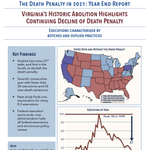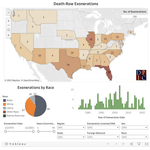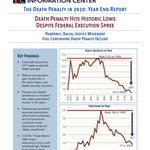DPI Reports
Below are reports released by the Death Penalty Information Center since its inception, covering subjects such as race, innocence, politicization, costs of the death penalty, and more. When opening a report, please allow the report page to load fully before selecting links to sections or footnotes. Most of these reports are also available in printed form from DPIC. For a copy of one of these reports, e‑mail DPI. For bulk orders, please download our Resource Order Form.
Reports are separated into Year End Reports, In-Depth Reports, and Special Reports. In-Depth Reports are DPI’s signature long, thorough reports on major death-penalty issues. These include “The 2% Death Penalty,” examining geographic arbitrariness in capital punishment, and “Behind the Curtain,” covering secrecy in the death penalty system. Special Reports are shorter, and typically address a specific event or question. These include DPI’s explanation of the 2017 spate of executions that were scheduled in Arkansas, and our analysis of the largest number of executions performed on a single day.
Reports: 11 — 15
Dec 16, 2021
The Death Penalty in 2021: Year End Report
The death penalty in 2021 was defined by two competing forces: the continuing long-term erosion of capital punishment across most of the country, and extreme conduct by a dwindling number of outlier jurisdictions to continue to pursue death sentences…
Read MoreJul 01, 2021
DPIC 2021 MID-YEAR REVIEW: Virginia’s Historic Death Penalty Abolition Accompanies Continuing Record-Low Death Penalty Usage in First Half of Year
The first half of 2021 spotlighted two continuing death-penalty trends in the United States: the continuing erosion of capital punishment in law and practice across the country; and the extreme and often lawless conduct of the few jurisdictions that have attempted to carry out executions this year. The year began with three executions that concluded the Trump administration’s unparalleled spree of 13 federal civilian executions in six months and two days,…
Read MoreFeb 18, 2021
DPIC Special Report: The Innocence Epidemic
In 1993, the House Judiciary Committee’s Subcommittee on Civil and Constitutional Rights conducted hearings on what was then a relatively unknown question: How significant was the risk that innocent people were being wrongfully convicted and sentenced to death in the United States. After taking testimony from four exonerees who had been wrongfully condemned to death row, Representative Don Edwards, the subcommittee chairman, asked the Death Penalty Information…
Read MoreDec 16, 2020
The Death Penalty in 2020: Year End Report
2020 was abnormal in almost every way, and that was clearly the case when it came to capital punishment in the United States. The interplay of four forces shaped the U.S. death penalty landscape in 2020: the nation’s long-term trend away from capital punishment; the worst global pandemic in more than a century; nationwide protests for racial justice; and the historically aberrant conduct of the federal administration. At the end of the year, more states had abolished the death penalty or gone…
Read MoreOct 23, 2020
DPIC Analysis: Use or Threat of Death Penalty Implicated in 19 Exoneration Cases in 2019
The use or threat of the death penalty was a factor in more than 13% of exonerations across the United States in 2019 and nearly 95% of those cases involved some form of major misconduct, a Death Penalty Information Center analysis of data from the National Registry of Exonerations has revealed. The DPIC review found that the death penalty played a role in at least 19 of the 143 exonerations in 2019 (13.3%) listed in the Registry’s annual exonerations report, resulting in…
Read More

